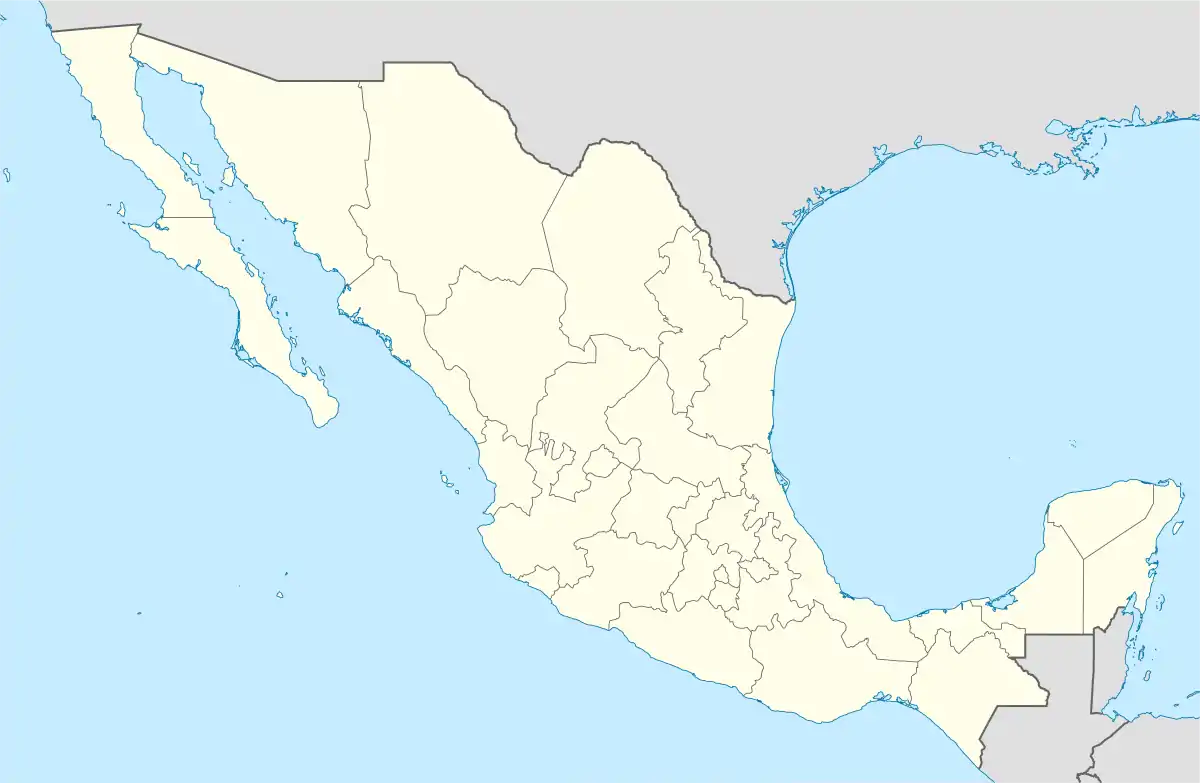Namiquipa
Namiquipa is a town in the Mexican state of Chihuahua. It serves as the municipal seat for the surrounding municipality of Namiquipa.
Namiquipa, Chihuahua | |
|---|---|
 Municipality of Namiquipa in Chihuahua | |
 Namiquipa, Chihuahua Location in Mexico | |
| Coordinates: 29°15′01″N 107°24′33″W | |
| Country | |
| State | Chihuahua |
| Municipality | Namiquipa |
| Franciscan Mission | 1763 |
| Town status | 1778 |
| Government | |
| • Municipal President | Héctor Ariel Meixueiro Muñoz (PRI) |
| Elevation | 1,888 m (6,194 ft) |
| Population (2010) | |
| • Total | 1,752 |
| Postal code | 31960 |
| Area code(s) | 659 |
| Demonym | Namiquipense |
As of 2010, the town of Namiquipa had a population of 1,752,[1] up from 1,718 as of 2005.[2]
History
The origin of the settlement is an indigenous village called Namiquipa.
Franciscan missionaries established a mission in 1662 or 1663 called San Pedro de Alcántara de Namiquipa.[3] It was subsequently abandoned.[4]
Namiquipa was refounded and given town (villa) status in 1778.[2] The Spanish colonial state established the town and surrounding region as a military colony, and its settlers received land grants in return for fighting Apache during the Apache Wars.[4]
Namiquipa was a stronghold of Pancho Villa’s popular movement during much of the Mexican Revolution of 1910–1920.[5] However, in 1916 locals switched sides and formed local militia that collaborated with the United States.[6] In 1917 Namiquipa was attacked by Villa and his men, who reportedly raped many townswomen after setting the town ablaze.[7] Villa's commander Nicolas Fernandez managed to take some of the townswomen under his protection, and ordered his soldiers to shoot any one who tried to attack them.[8] After news of the atrocity spread, Villa lost the goodwill of many villagers across Chihuahua.[8]
References
- "Namiquipa". Catálogo de Localidades. Secretaría de Desarrollo Social (SEDESOL). Retrieved 23 April 2014.
- "Namiquipa". Enciclopedia de los Municipios de México. Instituto Nacional para el Federalismo y el Desarrollo Municipal. Archived from the original on May 29, 2007. Retrieved October 13, 2008.
- Nugent, Daniel. (1993). Spent cartridges of revolution : an anthropological history of Namiquipa, Chihuahua. University of Chicago Press. p. 40. ISBN 0-226-60741-0. OCLC 807248816.
- Nugent, Daniel. (1998). Rural revolt in Mexico : U.S. intervention and the domain of subaltern politics. Duke University Press. p. 208. ISBN 0-8223-2113-0. OCLC 37560883.
- Alonso, Ana María (2009-12-31), Hansen, Thomas Blom; Stepputat, Finn (eds.), "Territorializing the Nation and "Integrating the Indian": "Mestizaje" in Mexican Official Discourses and Public Culture", Sovereign Bodies, Princeton University Press, pp. 39–60, doi:10.1515/9781400826698.39, ISBN 978-1-4008-2669-8
- Rubin, Jeffrey W. (1996). "Decentering the Regime: Culture and Regional Politics in Mexico". 31. 3: 85–126 – via JSTOR.
- Ana Maria Alonso (1995). Thread of Blood: Colonialism, Revolution, and Gender on Mexico's Northern Frontier. University of Arizona Press. pp. 1–6.
- Katz, Friedrich (1998). The life and times of Pancho Villa. pp. 634–636. ISBN 0-8047-3045-8. OCLC 37981391.
